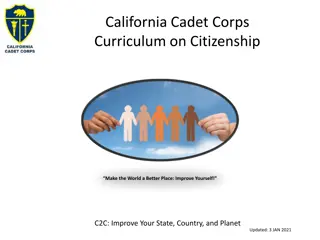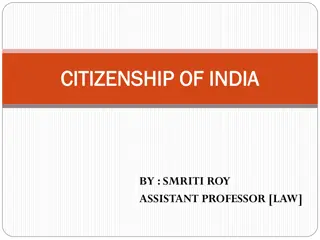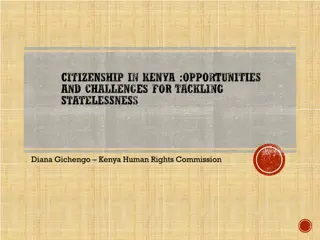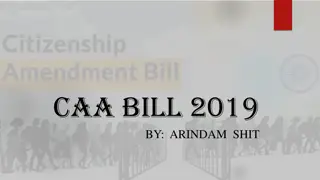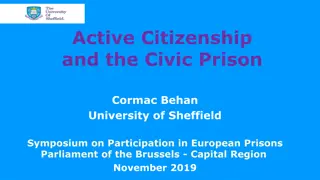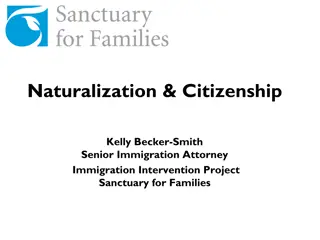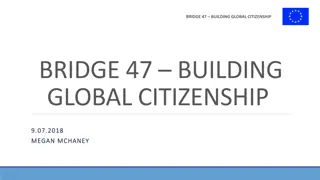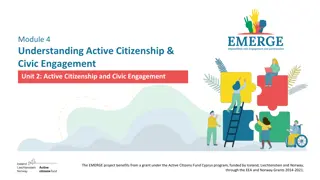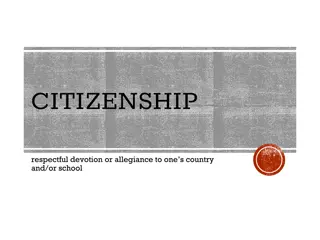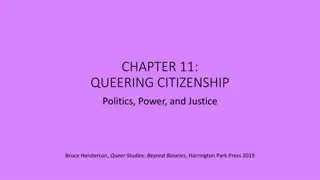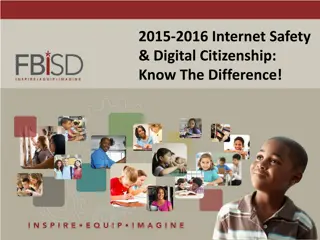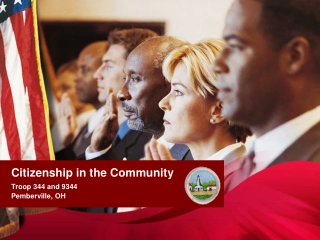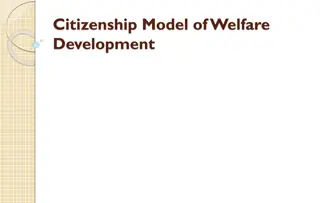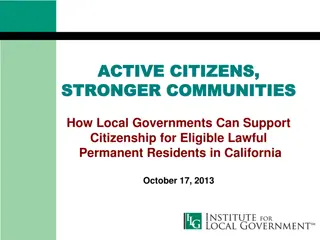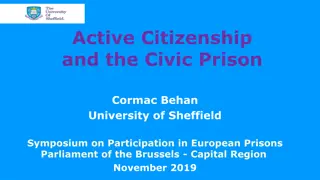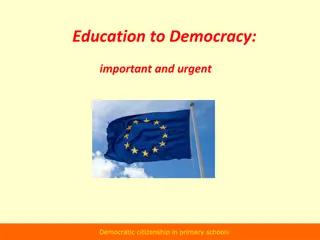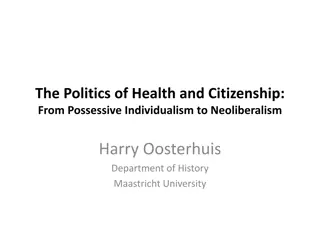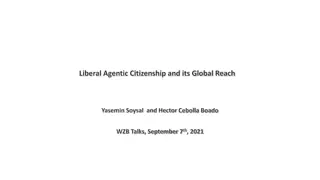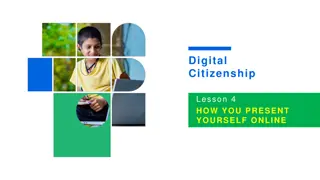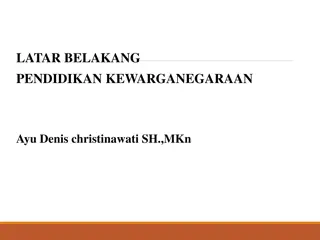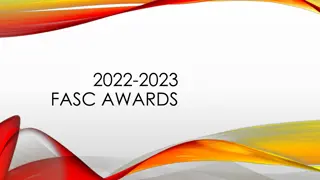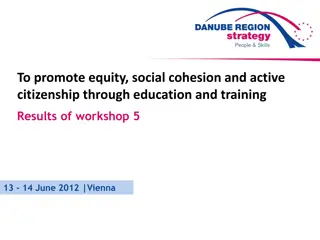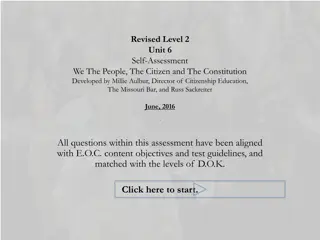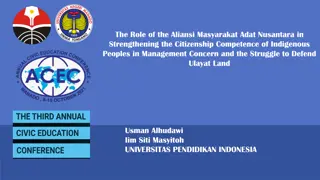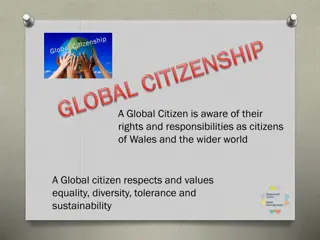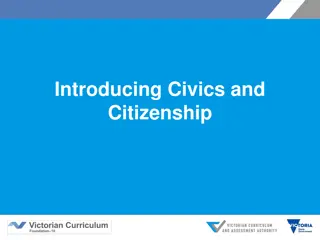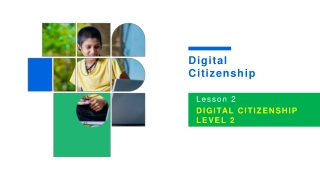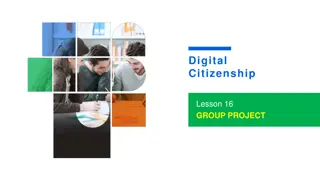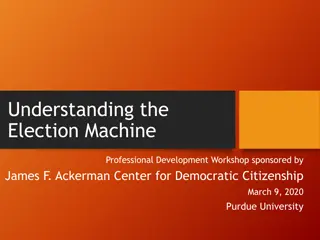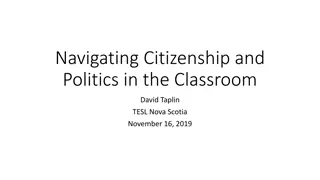Understanding Citizenship Through Aristotle's Four Aspects
Aristotle's concept of citizenship involves balancing individual autonomy, participation in public affairs, state authority, and social relations. A 2004 survey explored different dimensions of citizenship like participation, autonomy, adherence to social order, and solidarity. The data from the survey revealed varying levels of importance assigned to citizenship attributes, with duty-bound and engaged citizens showing distinct inclinations towards civic responsibilities.
Download Presentation

Please find below an Image/Link to download the presentation.
The content on the website is provided AS IS for your information and personal use only. It may not be sold, licensed, or shared on other websites without obtaining consent from the author. Download presentation by click this link. If you encounter any issues during the download, it is possible that the publisher has removed the file from their server.
E N D
Presentation Transcript
Aristotle: Citizenship balances two contending roles citizens are all who share in the civic life of ruling and being ruled in turn (Politics, italics added). So, in a democratic society this conception of citizenship implies 4 aspects: Individual Freedom/Autonomy Participation in Public/Civic Affairs The Authority of the State/Government Social Relations with Others
2004 General Social Survey asked this: There are different opinions as to what it takes to be a good citizen. As far as you are concerned personally, on a scale of 1 to 7, where 1 is not at all important and 7 is very important, how important is it to . . . There were several questions related to each dimension. Participate Be Autonomous Adhere to Social Order/Laws/Norms Help Others (Solidarity dimension)
Category GSS CDACS Participation 1. Always vote in elections 2. Be active in social groups 3. Choose products for political, social, or environmental reasons 1. Vote in elections 2. Be active in voluntary orgs 3. Be active in politics Autonomy 1. Try to understand reasoning of people with other opinions. 2. Keep watch on actions of government 1. Form opinion independently of others.
Category GSS CDACS Social Order 1. Always obey laws and regulations. 2. Never try to evade taxes. 3. Being willing to serve in the military in a time of need. 1. Always obey the laws and regulations. 2. Serve on a jury if called. 3. Men serve in the military when the country is at war. 4. Report a crime that one may have witnessed. Solidarity 1. Support people in America who are worse off. 2. Help people in the rest of the world who are worse off. 1. Support people who are worse off than oneself.
Survey Question Vote in Elections Never evade taxes Serve in the Military Obey the Law Keep Watch on Gov t. Active in Associations Understand Others Choose Products Help Worse off in World Help Worse off in America Duty-Bound Citizen .65 .65 .54 .51 .51 .39 .28 .22 -.12 .02 Engaged Citizen .17 -.01 .07 .10 .40 .54 .59 .59 .77 .77 Eigenvalue 1.95 2.37 Percent Variance 19.5% 23.7%
Variable Duty-Bound Citizen .84 .77 .64 .63 .56 .29 .16 .15 .10 2.56 28.5% Engaged Citizen .12 .09 .15 .32 .43 .47 .65 .80 .84 2.37 25.8% Report a Crime Always Obey the Law Serve in the Military Serve on a Jury Vote in Elections Form Own Opinions Support Worse Off Be Active in Politics Active in Voluntary Orgs Eigenvalue Percent Variance
Dalton repeated these analyses with 2014 and 2018 Data Same Results Is this good for knowledge?
Duty-Oriented White Men More religious Older Conservatives Republicans Non-college Lower income Engaged-Oriented Minority (non-Asian) Women Less religious Younger Liberals Democrats College-educated Higher income
0.5 *Other races *Nader Voters *African Americans *Graduate Degree *Religious *Gen X *Dems *Non religious *Women Engaged 0 *Whites Independents* *Men <Less than HS* *Republicans Pre WWII* -0.5 -0.5 Duty-Bound 0.5
Political Participation Duty-Bound: Less likely to engage in non-electoral forms of participation, e.g., protests, boycotts, writing letters/contacting politicians, contributing $, working in campaigns. Engaged: More likely to do the above
Political Tolerance of Marginalized Groups (Communists, Atheists, Militarists, Homosexuals, and Racists). Question Asked: Do you agree that ___ should be allowed to: 1. Speak in your community? 2. Teach in a college of university? 3. Have their books in the local library? Duty-Bound: Less tolerant of the above Engaged: More tolerant of the above
View/Evaluations of Government Duty: Tend to be more supportive Engaged: Tend to have mixed views Support for Democratic Principles Duty: Less support for the importance of democratic principles Engaged: More supportive View of How Well the Political System is Living up to these Democratic Principles Duty: View performance of democracy as living up to the principles Engaged: Sees political system coming up short on living up to the principles
Dalton, Russell J. 2021. The Good Citizen, 3rd Edition. Washington, D.C.: Sage, CQ Press. Dalton, Russell J. 2009. The Good Citizen, Revised Edition. Washington, D.C.: Sage, CQ Press. Dalton, Russell J. 2006. Citizenship Norms and Political Participation in America: The Good News Is . . . the Bad News is Wrong. The Center for Democracy and Civil Society Occasional Paper Series, Georgetown University (CDACS Occasional Paper 2006-01, October).




